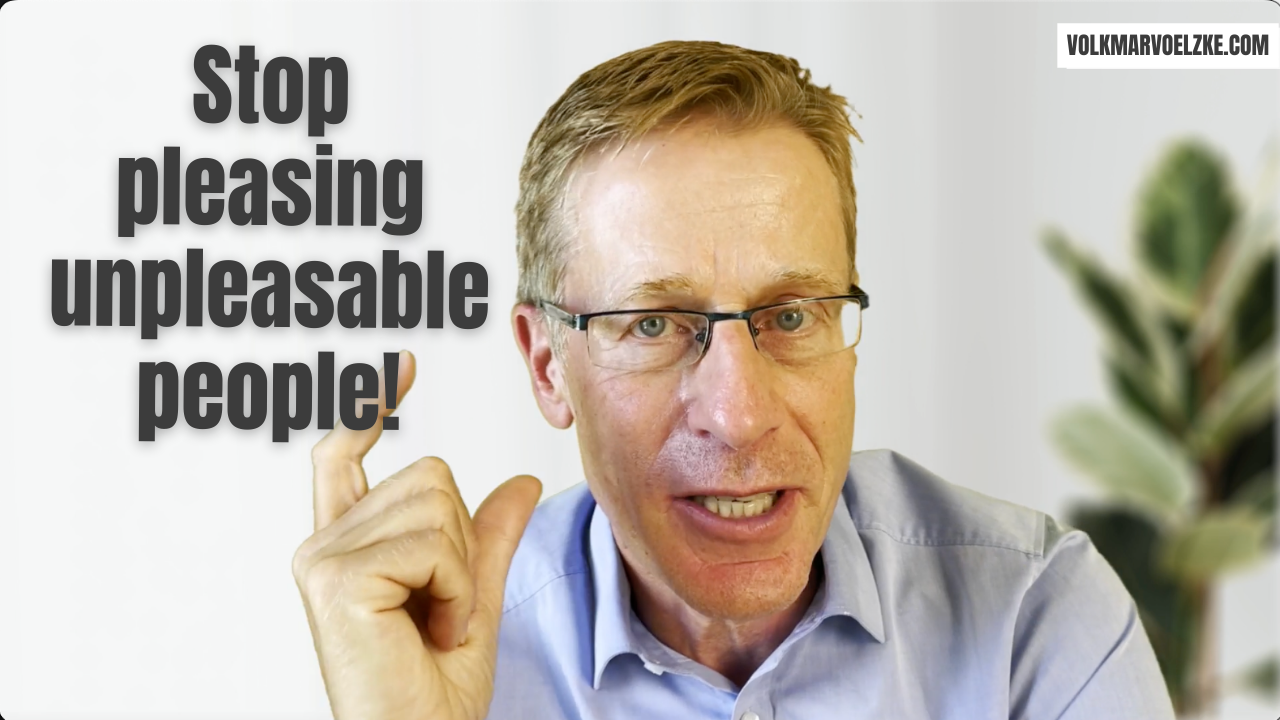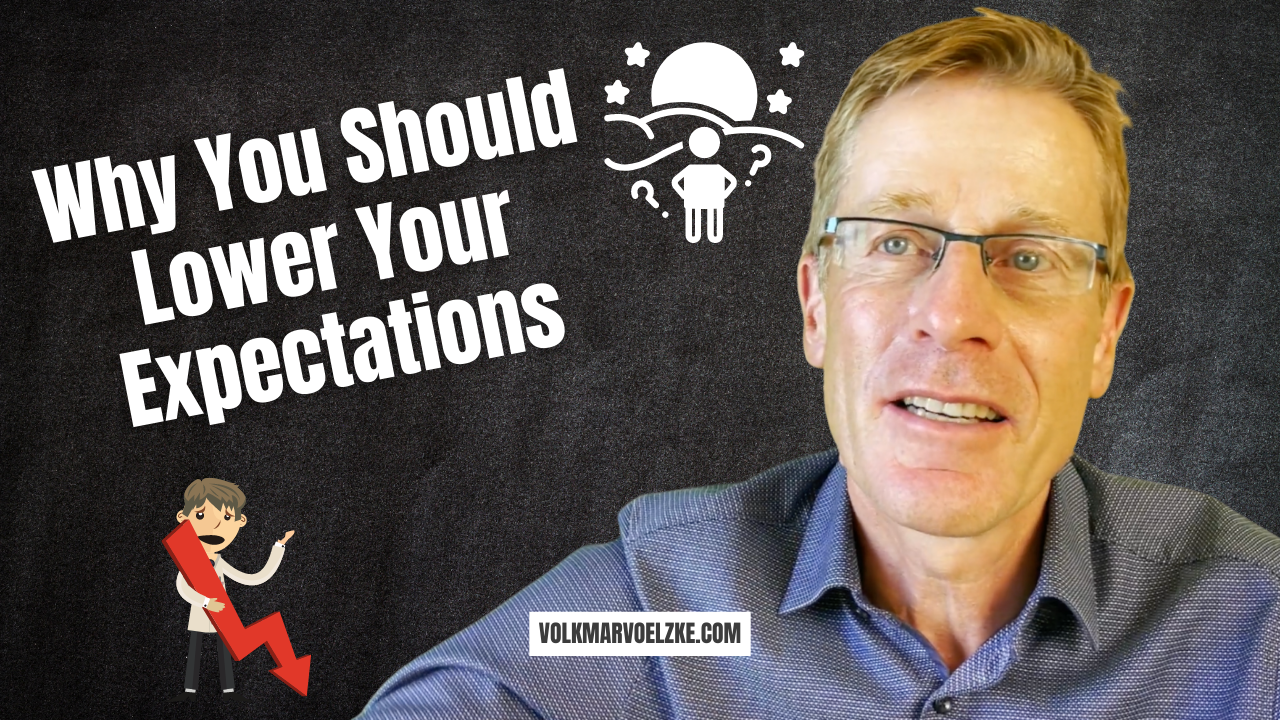🥹 What To Do When Things Go Wrong

You know me: most of the time I am writing and coaching about the positive aspects of life and business. I do this on purpose: all change comes from positive energy, all creativity stems from positive thoughts and all meaningful relationships–no matter if professional or personal–stem from positive assumptions about the other person.
That doesn’t mean successful people never have negative thoughts. Sure, they have! However, what they are better at than the rest is turning these negative thoughts into positive energy to generate change.
While average people get stuck in misery and helplessness, the overachievers are already on their way out.
So let’s get serious: I know that you sometimes struggle with your business, your team, or your career. I know that sometimes life and business really can be hard. I went through this, too. What I learned is how amazingly fast you can turn any backlash, any defeat, any smash in the face around and generate...
🤗 The 7 Most Common Mistakes When Praising

Appreciation is one of the most important levers of influence. And influence, in turn, characterizes leadership effectiveness.
So if you build the habit of expressing appreciation more often and more effectively, you will become a better leader.
The challenge here is that there are many traps in showing appreciation.
If you fall into these traps - and many of them are quite hidden - you can have the exact opposite effect of what you want. As a result, you diminish your impact, sometimes permanently.
So here are the seven biggest praise mistakes you should avoid at all costs:
-
Praise only the result
This may be surprising for many, but the exclusive praise and appreciation of the result leads us to associate the positive emotion with the achievement.
Among other things, this leads us to try only those things that are quite certain to bring us a result. The motivation to try something new or to take risks will decrease more and more.
What you should do instead: value personal effort...
🤸 We All Love To Change, Don’t We?

There are a million reasons why companies (and people) need to change. If you boil them all down, you end up with just two basic root causes for any change in life and in business:
- We HAVE to change.
- We WANT to change.
Yes, it’s that simple! Now guess which root cause the most successful people and businesses apply most of the time. You got it: they WANT to change. Why? Because they have the desire to become better, to explore new horizons, to improve situations.
On the other hand, most problems that businesses and people face stem from the fact that they only change when they HAVE to. The problem is that change often comes too late and at a high cost. However, there is another downside which is even more important: we get addicted to accepting the status quo until something or somebody else pushes us somewhere else. Many people live their entire life in this reactive mode. The same happens with businesses – before they drown.
Here comes the good...
💰 What Price Are You Willing To Pay?

All of life consists of a series of trade-offs, of choices between different alternatives:
If you do one thing, you usually can't do another at the same time. If you go to the mountains on vacation, you can't go to the sea at the same time (this was a typical family trade-off in my childhood, which is why we went to the mountains one year and to the sea the next).
Of course, there is also often the possibility of combining multiple activities or increasing efforts to pursue just more than one thing after all.
Elon Musk did manage to ramp up SpaceX and Tesla simultaneously (three days a week each for one, and three days for the other), but even he couldn't have scaled five other companies at the same time.
The threshold may be different, but ultimately we have to keep choosing between alternatives.
That's a central mantra of modern essentialism: most people have so many things going on at once that they're not only burned out and frustrated, they're barely moving anything forward...
👌 I Guess You Don’t Want To Be Excellent

Would you agree that excellence is a substantial competitive advantage for any business if the competitors are less excellent and excellence matters for customers? Sure, the answer is yes.
Why is it, then, that so many businesses are so far away from true excellence I wonder if their leaders truly have excellence as a goal?
Technically, it is not too difficult: Just do everything in an excellent manner. And here is the issue: the word “everything” is the challenge.
Almost all businesses are excellent at one or two things. Often, it’s the product and perhaps the customer service (even if the latter is questionable for most companies). However, as mentioned: EVERYTHING counts in excellence.
So, what can you do to develop your organization closer to excellence and by that gain a substantial competitive advantage? The key is systematic training in all areas of your business.
Here are three steps to do it the right way:
- Clarity. Clarify to...
💪 How To Become Mentally Stronger

Mental strength is one of the most important factors for success in all areas of life - and of course also in leadership.
Many of the root causes for difficulties in leadership and in life lie in mental weakness.
You notice mental strength not only by determination and perseverance, but - much more important - by flexibility and adaptability.
That is, mentally strong people create success with what they have right now, where they are, and with people who are around them right now. They never have the thought, "I'm missing something to success that I can't create."
In other words, energy and attitude do not depend on external circumstances, but solely on one's own decision.
The good news: mental strength can - and should - be trained. Three questions for certain situations, to which one must find the answer, help very well:
-
"What else can this mean?"
Ask yourself or others this question whenever something unexpected happens. After all, as you search for answers, you'll train...
🙅♂️ Stop pleasing unpleasable people

In this post, I’m sharing a tip by which you that can substantially increase your profitability. Hard to believe? Well, stay with me.
When are you more successful in life and in business? When you collaborate with people of a similar mindset who support you and each other or when you need to constantly convince others of your way forward? The answer is clear; however, why do so many people and entire businesses spend far too much energy on trying to convince skeptical people instead of thriving with the ones who love working with them?
I am mainly referring to your focus on the right customers here. Many CEOs and Sales Managers are not even aware of how much time they spend for trying to convince potential customers of their products who are deeply skeptical and constantly giving them a hard time.
Quite a lot of companies even spend most of their energy on trying to please almost unpleasable customers.
The most successful people and businesses have...
🥺 Should You Reduce Your Commitment?

You might be asking, "Shouldn't we rather increase our commitment to get more done and have fun doing it?"
Yes, of course we should. The only thing is: the key is to be committed to the right things.
Because commitment makes good things better and bad things worse.
If you are fully committed to a good relationship, it will get better and better. On the other hand, if you are fully committed to a toxic relationship, then you will keep running into a dead end.
The same is true at work:
Being highly committed to tasks and projects that don't match your goals or vision - or that keep draining your energy - leads to burnout and, in the long run, failure.
So how can you identify what you should be highly committed to - for yourself and with your team - and where you shouldn't? Here are three important questions:
-
What is your vision or ideal future state?
If you don't know where exactly you want to go, you can't decide what's really important. And with that, you also don't know what you...
😱 How To Scare Away Good Customers

I constantly find it amazing how many companies truly do their best to turn away their customers or avoid finding new ones.
Yes, I know that this sounds a bit cynical, but it is confirmed in real life almost each day. Let me share three examples in which you might even find practices of your own company, at least to a certain extent. I’ll then give you some ideas about how to change these practices for the better.
The owner of a restaurant in Zurich / Switzerland was staring at my wallet when I pulled out my credit card to pay and mentioned: “I see you have cash. Why don’t you pay with this? You know, I have to pay a fee for credit card transactions!” When I confirmed that I still want to pay by credit card he stated that we have to wait a while for the machine to pay. And yes, he let us wait another five minutes to do so. I will certainly never go there again nor will I leave a nice review on Trip Advisor. By the way, the food was not bad and the...
↘️ Why You Should Lower Your Expectations

You should lower your expectations? Seriously?
You may be wondering: Don't you usually hear from me that we should be ambitious and have high expectations? That most of us are flying too low?
Well, the resolution is quite simple and often overlooked: Have high ambitions, but not equally high expectations of others and the environment.
There's an old saying from happiness research: if you want to be happier, lower your expectations of everything outside your direct zone of influence.
Because those expectations of people or things you have limited influence over will always frustrate you if they are not met.
In other words, achieve more (through high ambitions) and be happy on the way to your goal (through low expectations).
So how can you put this into practice in a very concrete way in your everyday life? Here are three important steps:
-
High expectations of yourself.
Your expectations of everything in your direct sphere of influence should definitely be very high. This is...
